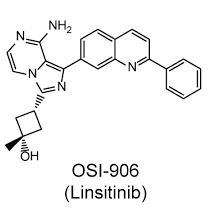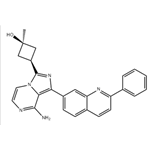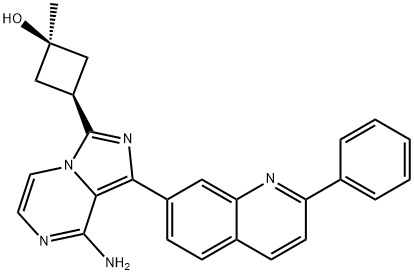Pharmacology of Linsitinib
Linsitinib is an experimental drug candidate for the treatment of various types of cancer. It is an inhibitor of the insulin receptor and of the insulin-like growth factor 1 receptor (IGF-1R). This prevents tumor cell proliferation and induces tumor cell apoptosis.
Linsitinib was granted orphan drug designation for adrenocortical carcinoma in March 2012.

Pharmacology
An orally bioavailable small molecule inhibitor of the insulin-like growth factor 1 receptor (IGF-1R) with potential antineoplastic activity. IGF-1R inhibitor OSI-906 selectively inhibits IGF-1R, which may result in the inhibition of tumor cell proliferation and the induction of tumor cell apoptosis.
Indication
Investigated for use/treatment in cancer/tumors (unspecified) and solid tumors.
Pharmacodynamics
In laboratory studies of 28 human tumor cell lines, OSI-906 reduced growth of 15 cell lines representative of colorectal, lung, breast, pancreatic, and pediatric tumors and in mouse models. OSI-906 was particularly effective against tumors that are highly IGF-dependent such as colorectal cancers. According to the researchers, OSI-906 not only slowed tumor growth in mice, but decreased the size of some pre-existing tumors.
Mechanism of action
IGF-1R stimulates proliferation, enables onogenic transformation, and suppresses apoptosis. Inhibitors of IGF-1R are expected to have broad utility in oncology since the over-expression of IGF-1R and/or its ligands or the down-regulation of ligand binding proteins occurs in numerous human malignancies including lung, colon, breast, prostate, brain and skin cancers. In addition, signaling through the IGF system has been implicated in protecting tumor cells from apoptosis induced by anti-cancer treatments such as cytotoxic agents and EGFR inhibitors.
You may like
Lastest Price from Linsitinib manufacturers

US $0.00-0.00/KG2025-04-04
- CAS:
- 867160-71-2
- Min. Order:
- 1KG
- Purity:
- 98%
- Supply Ability:
- 1Ton


